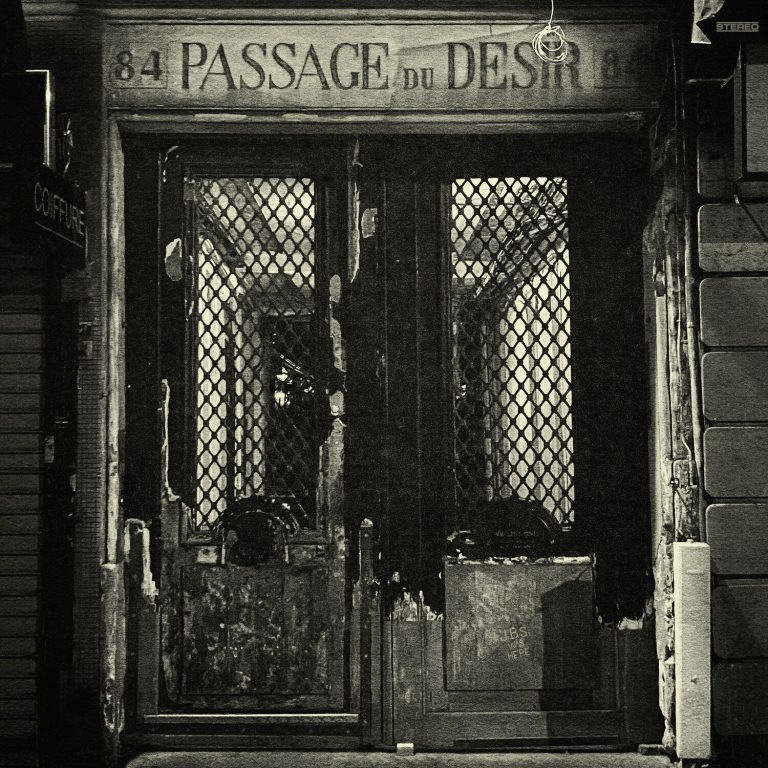2019’s Sound and Fury brims with forceful guitar forays. 2020’s Cuttin’ Grass (volumes 1 and 2) features bluegrass treatments of various tracks from the singer-songwriter’s catalog. 2021’s The Ballad of Dood and Juanita unfurls as a folksy and alternately tragic, rakish, and whimsical song cycle. While these ventures are compelling, each in its own way, they also occur as side projects or aesthetic tangents, Sturgill Simpson’s way of eschewing commercial expectations and defying that formidable foe: habit.
With his new album, Passage Du Desir, the now Paris, France-based Simpson adopts the moniker Johnny Blue Skies, yet ironically revels in a homecoming of sorts. Desir’s Simpson resembles the Simpson of eight to ten years ago, the steamy outsider of 2014’s Metamodern Sounds in Country Music meets the cool eclecticist of 2016’s A Sailor’s Guide to Earth. That said, with Desir, Simpson’s voice is more resonant than ever, his melodic sensibilities on full display. Over eight songs and 41 minutes, he forges sublime and heartfelt work, evoking the epic poles of experience: loneliness and belonging, forlornness and gratitude, faith and doubt.
With opener “Swamp of Sadness”, he casts himself as Odysseus fastened to the mast. “Trying to break the cycle of solitude and sin”, he moans, revisiting the nautical metaphors of his 2016 LP. He avoids over-defining what “the sirens” are, simply invoking the inescapability of desire or craving, whatever the trigger may be. The subsequent track, meanwhile, shows Simpson finding redemption via love. “All we need is starlight in our eyes”, he declares, basking in Edenic romanticism. He quickly, however, tumbles from idealism into consternation, asking, “What if the sun never rises again?”
With the ebullient “Mint Tea”, he offers an all-out paean to love, punctuating his verses with guitar licks that recall The Marshall Tucker Band’s talented frontman Toy Caldwell. Here he plays the role of the dedicated suitor while attempting to put his potential partner’s insecurities to rest. “So put another band-aid on this bullet wound”, he pleads, speaking to the merits of persistence, the magic of intimacy, and the healing properties of time.
“Scooter Blues”, perhaps the most jovial track in Simpson’s oeuvre, is a fantasy tale about moving to an island and embracing the simple life. “Jupiter’s Faerie”, on the other hand, portrays Simpson remembering an old friend with whom he had a falling out. He intends to contact the person but discovers that they’re “gone”, likely a victim of suicide. Simpson’s voice emanates regret and burden but also a certain indomitability. If “Scooter Blues” presents Simpson at his most playful, “Jupiter’s Faerie” frames him in a complexly pensive space, “crying tears of love in the light of mourning dawn”.
Simpson’s sonic context on closer “One for the Road” is notably rock-leaning; however, he’s clearly indebted, at least melodically, to such country icons as George Jones, Waylon Jennings, and Ronnie Milsap. Lyrically, he’s decidedly modish, addressing the contrast between public persona and inner reality. He, like most people, is burdened by secrets that he’s reluctant to share. As with “Swamp of Sadness”, he doesn’t specify what his dissonances are, rather proclaiming, “there’s some air that we need to clear”. Occasionally his sonorous tone and twang bring to mind Jamie Johnson, though Simpson is more self-reflective, even diaristic, drawn to the philosophic as much as the poetic. A long instrumental segment closes the set – swirls of pedal-steel guitar, twinkling acoustic strums, and a guitar part that starts out clean and wispy, quickly evolving into more distorted and weighty lead runs.
At the heart of Passage Du Desir is a sense of self as an indefinable and ever-changing function. Identity, Simpson might agree, is made of illusions. As he confesses mid-sequence, “I couldn’t tell her if I had to who I am”. Likewise, love can’t be pinned down or claimed, only stewarded. Still, he’s driven to study his experiences and comment on them. Though he rightly avoids volunteering answers to life’s perennial conundrums, his inquiries shimmer like gemstones, like sunlight on water.

